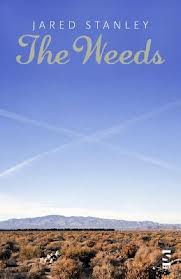"Half sun. Half thinking." Jared Stanley's Western Poetics (Just Deserts, part 2)
Jared
Stanley’s 2012 collection The Weeds (Salt:
London) represents a development in western poetics. Stanley’s writing sees human interactions as
part of the “natural world,” and connects not just to Romantic landscape
imagery, but to the intricacies of scientific representations, as well. That’s not the development, though. There’s plenty of western writing that sees
the ecological perspective (interwoven, interactive) instead of the
environmental (anthropocentric, isolated).
What I find fresh about Stanley’s poetics is that it’s not elegiac. Stanley’s not quietly weeping while the
glaciers bleed out. Neither is he
proselytizing on the street-corner, or, more applicably, from a laptop in an
air conditioned apartment. In his wild,
wide-ranging new book, Stanley’s clear-eyed about the situation vis-à-vis
global warming, extinction spiral, etc.:
your children’s
children’s children will be hanging around someplace. It might resemble the landscape you see
situated before you. Hot as shit, (taking
into account local variation), semi-non-permanent, some earthenware, knuckles
and dirt. Adjectives, if they still
exist, will include skulking, nasty, portable, blasted, cunning.
I
had the opportunity to work with Jared Stanley recently on a conversation poem,
based on our recent work in issue 14 of textsound. The result of our collaboration is a sound
piece that will appear in The Conversant sometime soon (I
think / hope). The process gave me an
opportunity to look again and more closely at The Weeds, and to extract from it a sequence of my favorite
passages. Taken together, I think they
make a pretty swell sort of assemblage.
I like it, and hope you do too.
I was born to high
radiation high
winds and high
temperatures
red peaks, lunar imitations
and swamp coolers.
Half sun. Half thinking.
Ruby-throated in the
paloverde
we came near this
town.
My mind came out in a
culvert
and the year came alive.
Then, as I say
“paleolithic cosmonauts landed the so-called starblower here,” your arms should
bend up, and your hands should form a diamond made of index fingers and thumbs
around the sun.
It would be easier to
use a rock to tell you about this, knock two of them together and let you hear
the cold dullness hollowly moving off the sheer granite and out towards the low
valley tract homes.
Our infiltrated
beautiful hair.
Our upended astrodome.
The sediment buried
them, and the silica laden waters infiltrated the flesh, duplicating its
structure cell by cell, becoming jasper, agate, and amethyst.
Under God’s cloud-eating
heart
the heat falls.
Can we say it, that
weeds are the intelligence of a disturbed earth?
If a head’s full of sky
laying down its sand
faith’s a little
disappointing.
As if your faith or my
books gave the sun much orange.
I’ll have clouds
surrounding my torso, thanks.
The water was held by
the rock, reminding you that you aren’t floating, that you are a thing.
My body quivers into a
receipt
twisted by the wind and
wrapped around scrub
—there’s a dry piece of
coyote shit—
Weeds outlast this
sentence.
Considered thoughts
become angular, subordinate feelings.
Weeds outlast this
sentence.
The sky jerks open.
Desert. Italicize it.
Fine. Good.
Let’s go.



Comments
Post a Comment